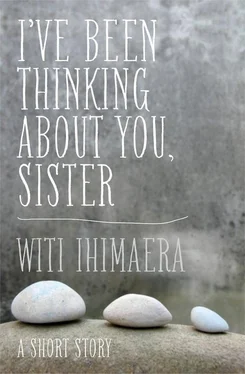As for Dad, well, he was surrounded by his adoring grandchildren, all weeping and wailing and gnashing their teeth as if they would never see him again.
The departure call was given. ‘Time to go,’ Mum said. ‘Come on, Dad.’ She walked out to the plane without a backward glance. As for Dad, he was the last to board. He had to hobble really fast to get there before the door closed, his new white trainers flashing across the tarmac.
I took a break from writing the story.
See what I mean about its essentialist nature? I recalled a meeting I had with the great English- Caribbean writer V. S. Naipaul when he visited Wellington in the 1970s. The poor man had been taken out for ‘a drive’ and suffered an over-enthusiastic seven-hour odyssey to Palmerston North and back. That evening, I joined him at a local PEN dinner where Professor Beeby, a wonderful raconteur, prefaced every comment to him with phrases like, ‘When I was in India …’ or ‘When I spoke to Nehru about the partition with Pakistan …’ or ‘When I spoke to Mrs Gandhi in Paris.’ Attempting to pull me into the conversation, Professor Beeby said to Mr Naipaul, ‘Of course we have a young Maori writer here whose work reminds me very much of your own first collection, Miguel Street .’ Mr Naipaul’s response was to give me a somewhat acidic look, sigh, and say, ‘Oh, he’ll have to do much better than that.’
I remembered with gloom how critics of my early work had pounced on its simplicity and pronounced that it was the literary equivalent of naīve paintings done by unsophisticated native artists: bold colours, representations of village life, but no subtlety — and where was the subtext? The critics seemed to be looking for somebody else; some Maori writer who was aware of literary theory, whose work they could fit into a more refined aesthetic and theoretical model — of cultural displacement, perhaps, directly concerned with the economic and political fabric of cultural existence, or with the racialised discourses of apartheid or colonialism — who would affirm the indigenous voice within the long-standing western European cultural anxieties to do with modernist texts. They wanted literature that operated on a more complex national, political, aesthetic, linguistic and cognitive level, contesting the language and discursive conventions that had historically been instruments ensuring that ‘the Other’ was kept subordinate.
Although I was Maori, I had the suspicion that ultimately the critics wanted that other writer to undo the discursive crime against Africa and to trace a genealogy through Foucault, Barthes and the later Blanchot to a reading — albeit from the South Pacific — of the upheavals in French literary culture precipitated by the anticolonial struggle in Algeria and by the events of May 1968.
Instead, they got me. That other writer must have got delayed when old lady Muse swung by in her Peugeot and mistakenly picked me up instead. Did she ever lose on the deal. She opened the door to sweet, stupid, lyrically voiced me, writing from the heart and not from the intellect, overabundant when I should have been minimalist, without any of those traits that critics wanted to see — particularly cynicism or pessimism.
You get what you get.
* * *
According to cousin Clarrie, the trip to Buenos Aires went very smoothly. She, Chad and Auntie Taina met Mum and Dad’s flight in Auckland.
‘Hello Uncle Tom,’ Clarrie smiled at Dad. ‘What flash white trainers you have. Auntie Aroha? Mum’s just over there with the suitcases.’ Mum was glad to have Auntie Taina’s company; they had been close for all the years since they became sisters-in-law. They chatted on the bus to the international terminal about whanau, who had died, who had married, who had had children, their own hopeless kids and thank goodness for the compensation of lovely grandchildren. When the bus arrived, Dad was delighted to see that a group of strapping young rugby players were on the same flight. Just his chance to let them know how terrific he had been as a left winger.
Dad has always loved talking to strangers. He loves to tell them about his tribe, his big family of brothers and sisters, his girlfriends (when Mum isn’t listening), his children, the farm, his exploits as a top shearer, how he almost became an All Black, how he could have been a world champion wrestler, and so on. Once he gets started he is difficult to stop — and on the flight he had a group of eager young boys who were trapped and couldn’t escape. They were polite and kept nodding their heads at his stories — which only encouraged him.
Clarrie told me later, ‘Don’t be so critical of your father! He’s just lovely! A real patriarch! Young boys love to hear your father telling about his life and giving them advice on what to do if the girl you like doesn’t like you back — even if it’s, well, somewhat old-fashioned and past its use-by date.’
‘I know what you mean,’ I said. ‘The difference is, of course, that strangers have never heard Dad’s stories before, whereas us kids have heard them again and again. And as for Dad’s advice — well, if I listened to it, I would still be a virgin.’
But to strangers like the rugby boys, Dad’s stories came out fresh, lively, splendid epics of trials that had been faced and triumphs accomplished against all odds. This was why people loved our father: he was such a terrific storyteller and a real spellbinder. By the time the plane landed in Buenos Aires, Dad had made many friends and received several invitations to come and visit.
‘Thank you,’ Mum said. ‘We’ll think about it.’ This was her usual reply whenever Dad received such invitations. It was much better than saying yes or no. People liked to think there was the possibility of a maybe.
* * *
My mother had strict instructions to call home at each leg of the journey so that the family could rest easy, they had survived another day. Somewhat grumpily she telephoned from a hotel close to Buenos Aires airport.
‘The eagles have landed,’ Mum said, ‘and, yes, your father is still hobbling along after me on his walking stick, so I haven’t been able to give him the slip — pity.’ I soon realised why she was grumpy when she gave me what-for. ‘And I have a bone to pick with you, son! You have to get Clarrie, Chad and Taina off our case. They’ve made arrangements for your father and me to be met at the airport in Paris by one of Chad’s old Vietnam veterans mates, who has plans to take us to dinner. But I’ve made bookings for us to see the Folies Bergère.’
I wasn’t listening to her. I was more alarmed at what I could hear in the background: screams, yells, lots of laughter, motorbikes revving up … and then, over her words, were those gunshots? ‘What the heck’s all the commotion?’ I asked.
‘When I told Donald to book us into cheap accommodation,’ Mum explained, ‘I didn’t expect he would put us somewhere we might get murdered in our beds. The taxi driver didn’t even want to bring us here. But Clarrie and Chad have barricaded the door and rung the rugby boys we met on the plane. We are expecting the football cavalry to arrive any minute.’
Of course, that was the kind of news guaranteed to keep me awake all night worrying about my parents. But Clarrie rang me the next morning from the airport to tell me that they had just put Mum and Dad on the plane to Barcelona. Clarrie sounded tired and strained.
‘What kind of hotel were you staying at?’ I asked.
‘Is that what it was?’ Clarrie answered. ‘You don’t want to know, cuz. Do they have Mafia in South America? Whatever was going down, your poor mum and dad were in the middle of it. You owe me big time.’
Читать дальше












